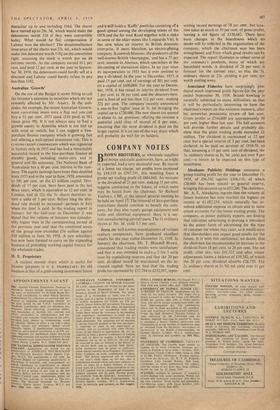INVESTMENT NOTE S
By CUSTOS
IT will have to be a "very favourable Budget to bring the steam back into the bull movement. The drop of nearly 20 per cent. in the ICI profits before tax is not a good pointer for indurial shares, although it was known that competition in the chemical trades had become particularly keen. ICI sales had been maintained but profit margins had declined in the past six months. The shares fell from 35s. to 34s. to yield 4.7 per cent. on the 8 per cent. dividend now barely covered twice on earnings. This will make investors all the more selective and inclined to exchange from the 'leaders' to smaller companies and special situa- . tions. After the Budget markets may also become more politically minded. It was noticed that steel shares rose on the Labour Party statement about 'fair compensation' (although that was vague enough), and fell on the results of the Norfolk by-election. Nervous holders of steel equities can always exchange into a steel convertible debenture stock which might not involve any loss if 'fair compensation' is honoured and could result in con- siderable profit, if the Conservatives win. This is SOUTH DURHAM STEEL AND IRON 6 per cent. con- vertible second debenture at 115+ c.d. 50 per cent. of each £100 stock is convertible into the ordinary shares at par on March 31, 1960, and in every year thereafter up to and including 1964. The shares have moved tip to 29s. 3d., which would make the debentures worth 126 if they were convertible today. What would be fair compensation if Labour won the election? The denationalisation issue price of the shares was 27s. 6d., which would make this debenture worth 1181 on the conversion right, assuming the stock is worth par on its intrinsic merits. As the company earned 611 per cent, and paid 12 per cent, in the year to Septem- ber 30. 1958, the debentures could hardly sell at a discount and Labour could hardly refuse to pay less than 118+.
Australian 'Growth'
On the eve of the Budget it seems fitting to call the investor's attention to securities which are not remotely affected by Mr. Amory. In the anti- podes, for example, the recent Australian Govern- ment conversion issues were a flop and you can buy a 51 per cent. 1973 stock (£10 paid) at 984 (issue price 99). It is not always easy to' find a growth equity in AuStralia which is not tied up with wool or metals, but I can suggest a hire- purchase finance company which is. growing fast and offering a well-spread investment risk. This is CUSTOM CREDIT CORPORATION which was registered in Sydney only in 1953 and has had a remarkably successful, record in the hire-purchase finance of durable goods, including motor-cars, and in general and life assurance, The National Bank of Australasia has a 40 per cent. interest in the com- pany. The equity earnings have more than doubled since 1955 and in the year to June, 1958, amounted to 301 per cent, on the £3 million capital. Divi- dends of 15 per cent, have been paid in the last three years, which is equivalent to 12 per cent. in London, and at Its. the 5s. shares therefore re- turn a yield of 5 per cent. Before long the divi- dend rate should be increased-perhaps in July when the final is paid. In the trading report in January for the half-year to December it was stated that the volume of business was consider- ably higher than in the corresponding period of the previous year and that the combined assets of the group now exceeded £56 million against £49 million at June 30, 1958. A new subsidiary has now been formed to carry on the expanding business of providing working capital finance for the wholesale trades.
H. E. Proprietary A curious outside share which is useful for income purposes is ii, E. PROPRIETARY. Its old business is that of a gold-mining investment house and it still holds a 'Kaffir' portfolio consisting of a good sptead among the developing mines of the OFS and the far west Rand together with a stake in some of the older mines like Luipaards Vlei. It has now taken an interest in British domestic enterprise. It owns Metalion, an electro-plating company. It controls Moussec, the producers of the well-known British 'champagne,' and has a 75 per cent. interest in Alumax, which specialises in the die-casting of aluminium alloys. In no year since its incorporation in 1931 has it ever omitted to pay a dividend. In the year to December, 1957, it paid 15 per cent, out of earnings of 301 per cent. on a capital of £6(X).000. For the year to Decem- ber, 1958, it has raised its interim dividend from 5 per cent, to 10 per cent. and the directors fore- cast a final of not less than 121 per cent., making 224 per cent. The company recently announced a one-in-five 'rights' issue at 7s. 6d. bringing the capital up to £720,000. The new shares are quoted at about 6s. 6d. premium, offering the investor a potential yield (free of stamp) of 8 per cent., assuming that the same dividend is paid on the larger capital. It is an out-of-the-way share which will probably do well for its holders.



































 Previous page
Previous page